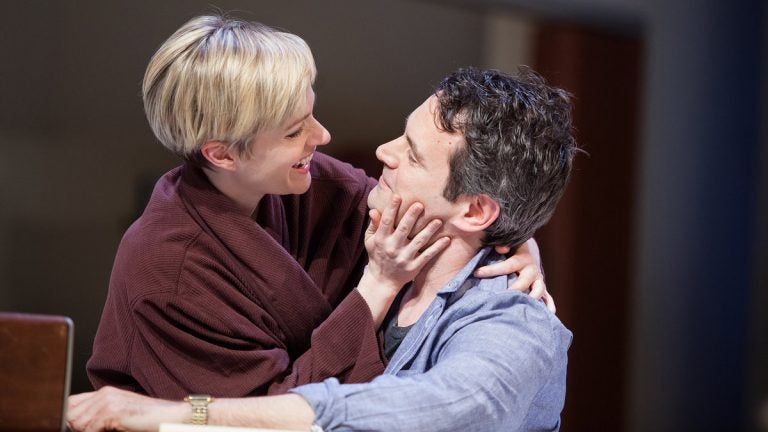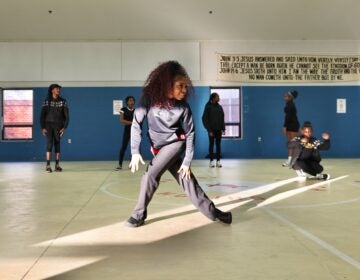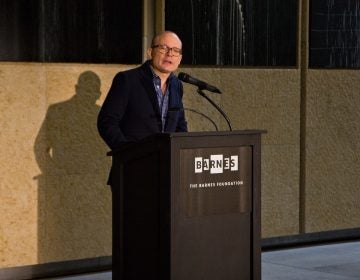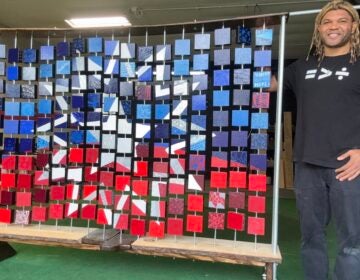Review: ‘The Real Thing,’ the real Stoppard

Suzy Jane Hunt and Kevin Collins in Wilma Theater's production of 'The Real Thing' (Photo courtesy of Alexander Iziliaev)
The heavy-hitting playwright Tom Stoppard has a special way of thinking, and that’s what makes him a singular voice.
He ties thoughts together in unique strands, and no one else can duplicate his particular design.
The result can be befuddling or enlightening – and sometimes both. There’s no denying his power, though, to sweep us into his thoughts when they resonate. I felt myself being swept along several times the other night, at Wilma Theater’s remarkably performed production of “The Real Thing,” Stoppard’s 1982 play that opened in London. Later, on Broadway, it won the best-play Tony Award.
I also found myself at times befuddled, caught in the bloat of Stoppard’s virtuosity with language. “The Real Thing,” involving a married playwright in love with an actor’s wife who is also in love with him, is about the aspects of love, the meaning of happiness and the nature of art. And it’s about each of those themes in big ways; Stoppard is not one to scratch a surface and move on.
I’ve been thinking about the production for the two days since I’ve seen it, about the way Stoppard gives voice to an idea through a character and then lets the character run with it. In “The Real Thing,” that character is Henry, the playwright, a picture of insufferable pretension but also of flashy brilliance. We don’t particularly want to like Henry, but Stoppard asks us to accept him as he is; when we do, we can make out much sense amid his gassy speechifying.
One example is an exceptional discourse Henry bursts into on the effect and stature of words themselves. Another comes as he considers the deeper truths about relationships – a soliloquy driven by the thought of partners scoring with each other.
Henry is played beautifully by Kevin Collins, a Bucks County native who’s built an impressive resume on London’s West End, in the British Isles generally and elsewhere overseas. Collins can be hang-dog, puppy-dog or wolf, all within minutes; he’s able to give his character an attractive complexity that makes us want to understand him. Suzy Jane Hunt plays his lover as both free-spirit and sprite – the match, in the interpretation of both actors, allows each to fill in the blanks of the other.
The supporting performers – Dan Hodge, Karen Peakes and, in smaller roles, Hannah Gold, Brian Ratcliffe and Harry Smith – are spot-on in portrayals of people who figure into this pairing of two people who take a leap from their former lives in order to begin again. David Kennedy, the director, moves the play smoothly along on Marsha Ginsberg’s gray-walled living-room set, which later moves back to reveal a mostly naked stage on which characters uninvolved in a scene sometimes sit, listening as those in the scene talk about them. Kennedy’s direction nicely manipulates the play’s intensity.
Blanka Zizka and her then-husband, the late Jiri Zizka, co-founded Wilma Theater and had an affinity with Stoppard and his work. All three were born in what’s now the Czech Republic, and the Zizkas knew and greatly admired him. Stoppard, in turn, has become an artistic friend of Wilma. “The Real Thing” is the tenth Stoppard play the stage company’s produced, and next year, Blanka Zizka will direct the 11th: “Rosencrantz and Guildenstern Are Dead.” The association has been a gift to Philadelphia theatergoers, who’ve had an opportunity to be more well-versed in the work of the celebrated contemporary playwright than those in most other places where theater matters.
“The Real” Thing” runs through June 22 at Wilma Theater, on Broad Street between locust and Spruce Streets. 215-546-7824 or www.wilmatheater.org.
WHYY is your source for fact-based, in-depth journalism and information. As a nonprofit organization, we rely on financial support from readers like you. Please give today.




